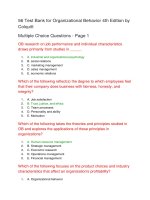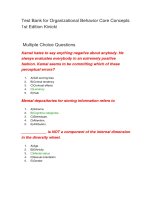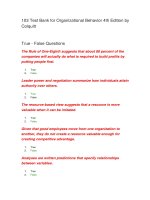Organizational behavior core concepts by kinicki chapter1
Bạn đang xem bản rút gọn của tài liệu. Xem và tải ngay bản đầy đủ của tài liệu tại đây (387.21 KB, 42 trang )
1
Organizational Behavior
core concepts
Organizational Behavior:
Why People Matter to
Organizations
1-2
McGraw-Hill/Irwin
Organizational Behavior, Core Concepts
Copyright © 2008 by the McGraw-Hill Companies, Inc. All rights reserved.
Learning Objectives
• Explain the importance of people skills to
management success
• Summarize principles for making ethical
decisions
• Describe how the role of managers is affected
by global business and the changing
workplace
• Define organizational behavior, and identify
disciplines that contribute to OB
1-3
Learning Objectives
• Discuss how OB has been shaped by total
quality management, the contingency
approach, appreciation of human and social
capital, and positive psychology
• Define e-business, and specify ways the
Internet is affecting the management of
people at work
1-4
Managers Get Results With and
Through Others
• Management
– process of working with and through others
to achieve organizational objectives
efficiently and ethically
• Today’s manager needs to creatively
envision and actively sell bold new
directions in an ethical and sensitive
manner
1-5
A Skills Profile for Managers
• Typical manager’s day is a fragmented
collection of brief episodes
• Interruptions are commonplace
• Large blocks of time
for planning are rare
1-6
A Skills Profile for Managers
1-7
1. Clarifies goals and objectives for
everyone involved.
2. Encourages participation, upward
communication, and suggestions.
3. Plans and organizes for an orderly
workflow.
4. Has technical and administrative
expertise to answer organizationrelated questions.
A Skills Profile for Managers
1-8
5. Facilitates work through team
building, training, coaching, and
support.
6. Provides feedback honestly and
constructively.
7. Keeps things moving by relying on
schedules, deadlines, and helpful
reminders.
A Skills Profile for Managers
1-9
8. Controls details without being
overbearing.
9. Applies reasonable pressure for goal
accomplishment.
10. Empowers and delegates key duties to
others while maintaining goal clarity and
commitment.
11. Recognizes good performance with
rewards and positive reinforcement.
Importance of Ethical Behavior
Ethics involves:
• The study of moral issues and choices
• Right vs. wrong
• Many shades of gray in supposedly
black-and-white issues
1-10
A Model of Ethical Behavior in the
Workplace
1-11
Figure 1-1
Making Ethical Decisions
• Ethical decision making frequently
involves trade-offs
• Begin by asking whether a proposed
action is legal
• Consider the impact of the alternative on
shareholder value
• Apply general moral principles
1-12
The Global Context:
Cultural Differences
• Societal cultures
– socially derived, taken-for-granted
assumptions about how to think, act,
perceive, and feel
1-13
Project GLOBE
Cultural Dimensions
1.
2.
3.
4.
5.
1-14
Power distance
Uncertainty avoidance
Societal collectivism
In-group collectivism
Gender egalitarianism
Project GLOBE
Cultural Dimensions
6.
7.
8.
9.
1-15
Assertiveness
Future orientation
Performance orientation
Humane orientation
21 -Century Managers
st
• Teams are pushing aside the individual
• Command-and-control management is
giving way to participative management
and empowerment
• Ego-centered leaders are being
replaced by customer-centered leaders
• Employees are being viewed as internal
customers
1-16
Evolution of the
21st Century Manager
1-17
Table 1-1
The Field of Organizational
Behavior
• Organizational Behavior
- Interdisciplinary field dedicated to better
understanding and managing people at
work
1-18
The Field of
Organizational Behavior
•
•
•
•
•
1-19
Psychology
Sociology
Social psychology
Statistics
Anthropology
• Economics
• Information
technology
• Political science
• Management
The Human Relations
Movement
• Legalization of union-management
collective bargaining
• Behavioral scientist called more
attention to the human factor
• Elton Mayo – Western Electric
Hawthorne study
1-20
The Hawthorne Legacy
• Interviews do not support initial
conclusions about positive effect of
supportive supervision
• Money, fear of unemployment,
managerial discipline and high quality
raw materials were responsible for high
output
1-21
Mary Parker Follett
• Follett saw employees as complex
bundles of attitudes, beliefs, and needs
• Managers should motivate job
performance
1-22
McGregor’s Theory Y
• Theory X assumptions
– pessimistic and negative, typical of how
managers traditionally
perceived employees
1-23
McGregor’s Theory Y
• Theory Y
– believed managers could accomplish more
through others by viewing them as selfenergized, committed,
responsible, and
creative beings
1-24
McGregor’s Theory X and Theory Y
1-25









